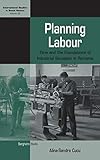Planning Labour : Time and the Foundations of Industrial Socialism in Romania / Alina-Sandra Cucu.
Material type: TextSeries: International Studies in Social History ; 32Publisher: New York ; Oxford : Berghahn Books, [2019]Copyright date: ©2019Description: 1 online resource (266 p.)Content type:
TextSeries: International Studies in Social History ; 32Publisher: New York ; Oxford : Berghahn Books, [2019]Copyright date: ©2019Description: 1 online resource (266 p.)Content type: - 9781789201857
- 9781789201864
- Central planning -- Romania -- History -- 20th century
- Government ownership -- Romania -- Cluj-Napoca -- History -- 20th century
- Socialism -- Romania -- Cluj-Napoca -- History -- 20th century
- Working class -- Romania -- Cluj-Napoca -- History -- 20th century
- POLITICAL SCIENCE / Labor & Industrial Relations
- Romania, Socialist Transformation, Socialist Industrialization, Socialist Accumulation, Cluj
- 331.109498/4 23
- online - DeGruyter
| Item type | Current library | Call number | URL | Status | Notes | Barcode | |
|---|---|---|---|---|---|---|---|
 eBook
eBook
|
Biblioteca "Angelicum" Pont. Univ. S.Tommaso d'Aquino Nuvola online | online - DeGruyter (Browse shelf(Opens below)) | Online access | Not for loan (Accesso limitato) | Accesso per gli utenti autorizzati / Access for authorized users | (dgr)9781789201864 |
Browsing Biblioteca "Angelicum" Pont. Univ. S.Tommaso d'Aquino shelves, Shelving location: Nuvola online Close shelf browser (Hides shelf browser)
Frontmatter -- Contents -- Tables -- Foreword: What Was the Plan? And What Was It Meant to Do? -- Acknowledgements -- Introduction -- I Primitive Socialist Accumulation in Cluj -- Chapter 1 Productive State Apparatuses Taking Over the Factories, 1944–1948 -- Chapter 2 ‘More Precious Than Gold’ Labour Instability and the ‘Stickiness’ of Everyday Life -- Chapter 3 ‘Workers’, ‘Proletarians’ and the Struggle for Cheap Labour -- II Time and Accumulation on the Shop Floor -- Chapter 4 ‘Hidden Reserves of Productivity’ and the Quest for Knowledge -- Chapter 5 Productive Flows and Factory Discipline -- Chapter 6 Planned Heroism and Nonsynchronicity on the Shop Floor -- Epilogue: Really Existing Socialism as Nonsynchronicity -- Bibliography -- Index
restricted access online access with authorization star
http://purl.org/coar/access_right/c_16ec
Impoverished, indebted, and underdeveloped at the close of World War II, Romania underwent dramatic changes as part of its transition to a centrally planned economy. As with the Soviet experience, it pursued a policy of “primitive socialist accumulation” whereby the state appropriated agricultural surplus and restricted workers’ consumption in support of industrial growth. Focusing on the daily operations of planning in the ethnically mixed city of Cluj from 1945 to 1955, this book argues that socialist accumulation was deeply contradictory: it not only inherited some of the classical tensions of capital accumulation, but also generated its own, which derived from the multivocal nature of the state socialist worker as a creator of value, as living labour, and as a subject of emancipatory politics.
Mode of access: Internet via World Wide Web.
In English.
Description based on online resource; title from PDF title page (publisher's Web site, viewed 25. Jun 2024)









